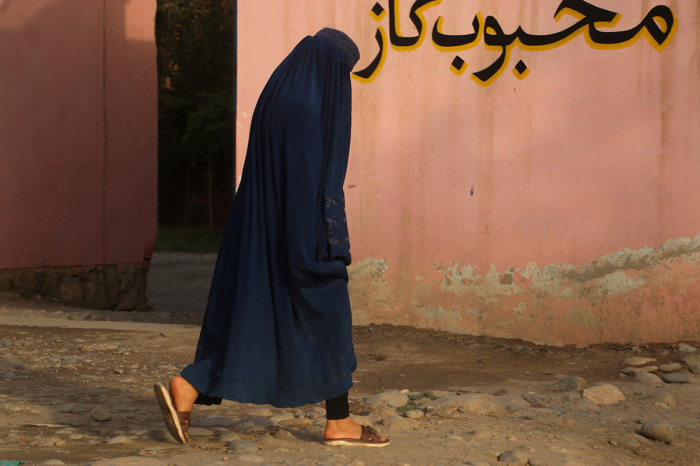Taliban bans women from speaking, showing bare faces in public

New laws passed by the Taliban regime that ban women from speaking or showing their faces in public have been condemned by the U.N. and human rights groups.
Three years after taking over Afghanistan amid a hasty U.S. withdrawal under the Biden administration, the Taliban passed several “vice and virtue” laws last week, ordering Afghan women to cover their faces in public and to wear thick clothing so that men are not tempted. The laws also prohibit women from speaking in public, looking at men they are not related to, and must be accompanied by a man if they venture outside their home.
Earlier this week, the United Nations denounced the Taliban's vice and virtue laws. Ravina Shamdasani, a spokesperson for the Office of the U.N. High Commissioner for Human Rights, was quoted in the report as saying that the prohibitions on women, called the “Law on the Promotion of Virtue and the Prevention of Vice,” effectively “silences women’s voices and deprives them of their autonomy.”
“This is utterly intolerable,” Shamdasani stated. “We call on the de facto authorities to immediately repeal this legislation, which is in clear violation of Afghanistan’s obligations under international human rights law.”
Fawzia Koofi, an Afghan human rights activist and the first woman vice president of the Afghan Parliament, stating that the new law is “designed to further erase and suppress” women and is “an indication of their hatred towards women.”
“When they say women cannot speak in public as they regard women’s voices as a form of intimacy it is incredibly frightening yet the whole world acts like this is normal,” Koofi said, as quoted by The Guardian.
“There have been very few reactions of comments to what is happening and the Taliban are emboldened by this indifference. It is not only women but all human beings they are targeting. They must be held accountable.”
Zabihullah Mujahid, the main spokesman for the Taliban, brushed away objections to the new law, warning against “arrogance” from people who might not be familiar with Islamic law.
“We urge a thorough understanding of these laws and a respectful acknowledgment of Islamic values. To reject these laws without such understanding is, in our view, an expression of arrogance,” Mujahid said, according to The Associated Press. “We must stress that the concerns raised by various parties will not sway the Islamic Emirate from its commitment to upholding and enforcing Islamic law.”
These laws follow a 2022 decree issued by the Taliban’s Ministry for the Propagation of Virtue and the Prevention of Vice that demanded women wear a "proper hijab" in public. Earlier this year, the Taliban arrested several women for purportedly wearing a “bad hijab,” a violation of the group’s strict dress code.
Sahar Fetrat of Human Rights Watch, an expert on women's rights issues and a native of Afghanistan, told The Christian Post in an interview in January 2023 that the Taliban had been engaged in a “continuous infringement of women's rights and restriction of women's access to basic rights and facilities."
"Since August 2021, women's rights have been under constant attack by the Taliban," said Fetrat. "The Taliban started systematically attacking women's rights by taking away women's liberty, subjectivity and removing women and girls from social and political spheres."
"The Taliban's nonstop attack on women's rights has deprived women and girls of education, employment, access to healthcare and practicing agency."
In August 2021, the Biden administration pulled out the remainder of its troops from Afghanistan without first informing U.S. allies. The withdrawal occurred 20 years after initially helping to overthrow the Taliban.
Amid the withdrawal, Taliban forces waged a rapid reconquest of the Central Asian country, resulting in a chaotic evacuation of thousands of Afghans fearful of retribution.
Although President Joe Biden had promised to use "economic tools" to help protect human rights in Afghanistan under the Taliban, the regime launched a series of efforts to enforce strict Sharia law.




























